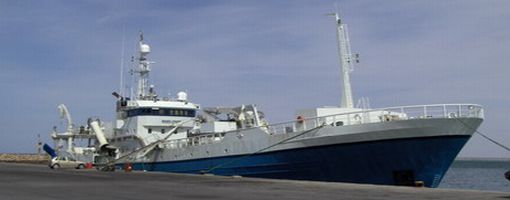
One of the companies of shipowner Kristian Eidesvik is a large investor in disputed Western Sahara. The Norwegian Ministry of Foreign Affairs advises against such practice. "Theft of our resources", says activist Aminatou Haidar. Bergens Tidende daily, March 10, 2007.
By Ingvild Rugland
Read the whole story in Bergens Tidende, March 10, 2007 (Norwegian newspaper)
Aminatou Haidar (40) is a human rights activist from Western Sahara. The Rafto Foundation and Amnesty invited her to the celebration of the International Women's Day on March 8 in Bergen, Norway.
She is indignant about Western companies that are engaging themselves in Western Sahara, an area that is under occupation by Morocco. Kristian Eidesvik is a board member and joint owner of the company Sjøvik, that for a year has been carrying out fishing activities outside Western Sahara.
"The money goes directly to Morocco. This is theft of the resources of Western Sahara", Haidar says.
The Foreign Ministry advises against
The Norwegian Ministry for Foreign Affairs advises against Norwegian companies engaging themselves in commercial activities in the occupied area.
The Sjøvik-group does not care about that.
"We have not been discouraged to do anything by the Foreign Ministry. We only have been informed by the Norwegian Guarantee Institute for Export Credits (GIEK) that they will not provide financial support to our project, the managing director of Sjøvik", Odd Kjell Sjøvik, says.
He is of the opinion that the fishery project is good for the population of Western Sahara.
"The project aims at harvesting the resources that are to be found outside the coast of Western Africa. The region wants to develop its fishing industry, both ashore and at sea", Sjøvik says.
The Norwegian Government Pension Fund (formerly the Petroleum Fund) was at an earlier stage investing in the American energy company Kerr-McGee, but withdrew as a consequence of the companys activities precisely in Western Sahara.
The UN is working to solve the conflict, and USA is putting pressure on Morocco to find a solution.
Torture
Aminatou Haidar relates a daily life in Western Sahara that is all about violence and torture against the civilian population, several hundred political prisoners and no freedom of speech. She herself has been imprisoned twice. The first time lasted four and a half year, the last seven months in 2005.
As long as the conflict about the future of Western Sahara remains unresolved, Haidar cannot understand how enterprises can be active there.
"This amounts to acknowledging Morocco as an occupying power. As long as the enterprises continue their activities, our situation will persist", Aminatou Haidar says.
The celebration of March 8 in Bergen is icy. A totally different climate than Aminatou Haidar is used to. Nevertheless she is radiantly satisfied.
"It is incredible that there is no police to be seen anywhere. At home we do not have the right to demonstrate".
Because of her involvement in the fight for independence for Western Sahara, the authorities has taken control over her salary. She simply does not get any money.
"I live off my family, while my ex-husband takes care of my two children", she tells us.
Clear conscience
Odd Kjell Søvik thinks the projects of the Søvik group are beneficial for the local population.
"We provide an opportunity for the poor population to harvest outside their coast, and we give jobs to the poor. This is to the advantage of the local population."
"What do you think about civilians being tortured and imprisoned without reason?"
"We hear many such stories and it had been fine if the Norwegian press had investigated both sides of the conflict", Sjøvik says.
"We have a clear conscience", he adds.
Unproblematic situation
Kristian Eidesvik finds the engagement outside of Western Sahara to be totally unproblematic.
"It never occurred to me that this represented a problem", Kristian Eidesvik says.
He is joint owner and board member in the company that operates outside the coast of the occupied Western Sahara.
The fact that the Norwegian Foreign Ministry advises against "commercial relations" with Western Sahara, is something Eidesvik classifies as “UN issues”.
"We are reflecting on it, but I guess we haven't really paid attention to it. I have no intention to bring this up in the Board, to put it that way. But we do know about it", says Kristian Eidesvik.
Translated to English by the Norwegian Support Committee for Western Sahara.
Order our Western Sahara poster!
“Try to Visit Western Sahara”…
The Security Council fails Western Sahara and international law
On 31 October 2025, a new resolution was adopted in the UN Security Council calling on the Saharawis to negotiate a solution that would entail their incorporation into the occupying power, Morocco.
Saharawis Demonstrate Against Trump Proposal
The United States has proposed in a meeting of the UN Security Council on Thursday that the occupied Western Sahara be incorporated into Morocco.
Skretting Turkey misled about sustainability
Dutch-Norwegian fish feed giant admits using conflict fishmeal from occupied Western Sahara. Last month, it removed a fake sustainability claim from its website.



